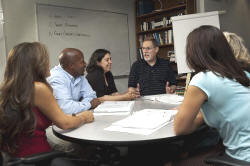ELT Concourse: entering English Language Teaching (ELT)
 |
| Taking the plunge |
If you can read this, thank a teacher.
 |
 |
 |
 |
What is English language teaching like? |
|||
Almost infinitely variable. All languages are enormous.
There are thousands of them, some spoken by billions and some by
only a handful of people or even a single individual. Each
language is unique (although there are commonalities and some
members of the same language family may be quite similar).
English is, however, unique in some respects that other languages do
not share. It is spoken as a first language by fewer people
than those who speak it as a second or additional language. It
has become, and looks set to remain, the world's lingua franca.
Almost every country on earth requires schools to teach English but
how it happens, who does it and what is in the syllabus varies from
country to country and often from school to school.
For an introduction to what English Language Teaching is, click
here (new tab).
 |
What qualification(s) do I need? |
In most countries, becoming a teacher requires years of training,
whatever the subject or age group that is concerned. English
language teaching is somewhat unusual in this respect because short
initial training courses are available which will provide the basic
knowledge and classroom abilities to start you off in your career.
These sorts of courses are available whether your first language is
English or not but, obviously, you will be expected to speak and
write English to a high degree of accuracy and appropriacy before
you start your training.
Many people teach a language with no qualification other than the
ability to speak the target language to some degree of proficiency or as a
native speaker. Unqualified teachers often, of course, do more
harm than good although there are honourable exceptions.
You should not consider entering English language teaching unless
you are prepared to take a training course. What sort of
course you take is up to you but there are important considerations
to bear in mind when deciding how to get yourself initially
qualified.
Click here to go to some advice and frequently
asked questions about choosing a course (new tab).
 |
Questions and answers |
Q: What are the opportunities for English Language
teachers?
A: English has been described as the operating
system of global conversation. The British Council estimates that some 2 billion people
are using it or learning to use it for whom it is not
their first language.
This is an enormous market for skilled English language teachers who have the
opportunity to work in almost every country in the world.
In countries where the first language is not English, there are opportunities in
many settings and many learners travel to nations where English is an or the
official language so there are opportunities there, too.
Q: Where does teaching happen?
A: English language teaching
happens in schools, in colleges, in companies, on line, in private homes and
across the kitchen table. Resources vary and some will find
themselves challenged by a lack of equipment and materials while
others will have the benefit of well-resourced environments where
the challenge its often to make the most of the technology and range
of materials on hand.
Q: Is it well paid?
A: No, in general, although the
picture is very varied within and between countries. The
better qualified you are and the more
experience you have, the better paid you will be. And, of
course, as you progress up the career ladder, remuneration generally
increases.
Wealthier countries usually pay more for teaching staff but the
cost of living is also generally higher.
Countries with long-established English-language teaching cultures
are also those with the greatest demands for teachers and pay can be
correspondingly competitive.
Q: Is it satisfying?
A: Enormously for many people. Very
little beats the gratification of helping people to express
themselves in a foreign language, improve their career prospects,
open doors to other cultures and access a truly global language.
Q: Who are the learners?
A: People. You may find yourself
teaching young children, teenagers, university and college students,
people in business settings, retired people and anything in between.
All have their particular challenges and rewards.
Q: Is there a career ladder?
A: Yes, although classroom teachers will
outnumber academic managers, course writers, publishers and so on by
the nature of the profession.
Career opportunities are there for those whose talents and
qualifications allow them to make progress but they are generally
only open to those who are prepared to enhance their qualifications
by taking more advanced courses and who have a varied and
interesting teaching background.
In addition to teaching, there are opportunities in teacher
training, publishing, materials writing, examining, school
management and in other connected fields working within schools,
colleges, universities, government departments, industry and
commerce.
 |
Is English language teaching for me? |
Got a pencil and paper handy? Take this test and write down
your score at the end.
In this test, only your first selection will be scored.
You can click on the other answers to see what feedback you get. Click here to take the test.
Click here when you have finished the test and recorded your score.
What did you score?
| Below 50% | You should think carefully before investing in a training course. English Language Teaching is probably not for you. |
| 50 to 70% | You probably see English Language Teaching as a temporary career. That's OK providing you take it seriously. |
| Over 70% | English Language Teaching is for you. Why not enter a career where you get paid for doing what you like doing? |
Of course, all the above is dependent on your having taken the exercise seriously.
If you scored OK and you'd like some advice about what course to follow, click here.
Reference:
The British Council, The English Effect: The impact of
English, what it’s worth to the UK and why it matters to the
world available at
https://www.britishcouncil.org/sites/default/files/english-effect-report-v2.pdf
